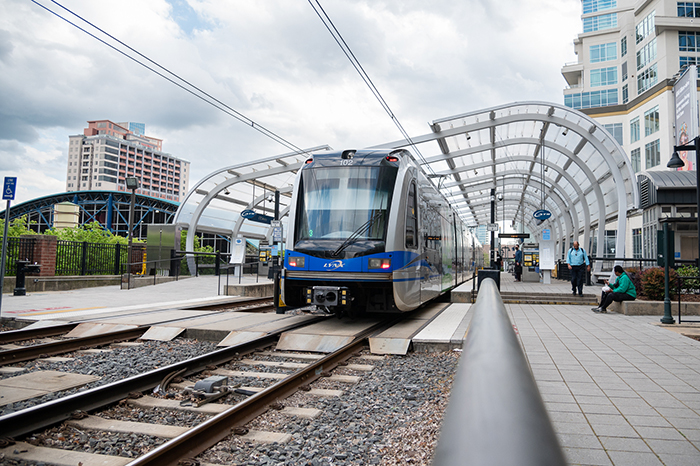By Kylie Marsh
The Charlotte Post
Javon Patterson uses the bus, operated by Charlotte Area Transit Systems, to get to and from work at the Charlotte Douglas International airport.
“I love it, it’s really convenient,” he said, pulling up his CATS Pass app on his phone.
Patterson scrolls through the map, illuminated with bus stops, and stops when he finds the location of the bus, which is tracked live, on the map.
“You can go all the way across the city for $2.20,” he said.
Convenience and affordability are relative, though, as Patterson says he’s in the process of buying a car. To get to work on time, he must board the bus at 7 a.m. to make his 9 a.m. shift start.
To make up for the shortcomings of CATS buses, state Sen. Vicki Sawyer and Rep. Tricia Cotham introduced bills that would put a one-cent sales tax referendum on November’s municipal ballot.
Cotham’s bill, HB 948 or the Projects for Advancing Vehicle infrastructure Enhancements, or PAVE Act, would dedicate 40% of monthly revenues from the tax to maintaining roadway systems and the remainder for CATS. Sawyer’s bill, SB 145, or the Mecklenburg Transportation Referendum, is nearly identical.
At a transit town hall hosted by the Black Voter Project, local officials discussed the pros and cons of the tax provision last week at Weeping Willow AME Zion Church in south Charlotte. The BVP, co-founded by Colette Forrest, seeks to engage voters. CATS Interim CEO Brent Cagle said most Charlotte’s bus riders are working class people of color, with 60% of them Black.
During the discussion, one person in the audience expressed frustration that the bond referendums are always at the end of a long ballot and written in confusing language. Both bills state that the referendum’s language would read: “One percent (1%) local sales and use taxes, in addition to the current local sales and use taxes, to be used only for roadway systems and public transportation systems.”
“We know taxes hit everybody hard. Nobody likes taxes,” Cagle said. He added that 30% of sales tax revenues come from visitors. According to Cagle, Sawyer’s bill states that no more than 40% of monthly tax revenues can be dedicated to rail improvements, leaving the rest for road improvements.
Forrest said that the referendum won’t go forward if Black residents don’t vote, but many at the town hall were already familiar with the tax proposal and bills.
Kendrick Cunningham, a political strategist with Withers-Zoenak Associates Consulting, noticed that the electorate needed to push the referendum across the finish line were not in attendance. He contended Black elected officials have “consolidated power” and “aren’t empower grassroots leaders” that would better connect to working class people. Even the town hall’s start time – 6 p.m. – was an issue.
“A lot of working-class people work at this time, so they aren’t able to make it,” Cunningham said.
Part of the discussion centered on prioritizing commuter rail over bus improvements.
“Without buses, we can’t have a rail system,” Mayor Vi Lyles said, adding that the connectivity could improve workforce development and access to commuters. “We have to pull this together, but without the funding, we don’t have anything to pull.”
Mecklenburg County commissioners Chair Mark Jerrell said decisions made today “won’t be felt until 2045 or 2055.”
The tax would push forward the “Better Bus model,” which would get all buses on a 15-minute frequency, which supporters contend would increase access and socioeconomic opportunity for commuters.
“This could serve 202,000 more people of color compared to the 40 thousand it’s serving right now,” Jerrell said. “Three hundred twenty thousand more jobs would be accessible within a half mile of the 15-minute frequency than 120,000 today.”

